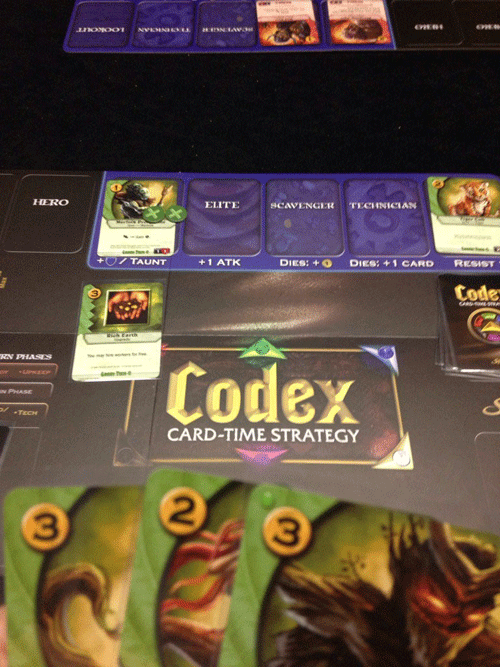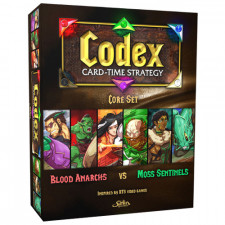Codex: Core Set Review
on Dec 1, 2016
Codex is beautiful. It's a conceptually astounding design that nails its premise and simply delivers. It does this by liberally borrowing elements of Magic, Dominion, Mage Wars, and Hearthstone. It fuses all these disparate mechanisms into a very smooth core that drives a card game version of real-time strategy games.
Chuck WarCraft in there with those other notable designs and you have a Long Island ice tea that will knock you right out and leave you feeling mighty good. The only hangover experienced is the pulse of gears turning in your head as you ruminate on strategic decisions for the next several days.
This central engine is a typical blend of deck building where you draw a hand of cards from your personal deck and alternate turns with an opponent. Your decks are asymmetrical and faction specific, however, which is the first taste of spice. The core set features the vicious Blood Anarchs (Red) versus the Moss Sentinels (Green).
As you'd expect red is all about blowing stuff up and inflicting carnage. Your card options consist of units you deploy to the board that are adept at hitting fast and hard. Green is all about serene nature, buffing, and employing beasts of the forest to tear you limb from limb. They both play very differently and offer exceptional strategic depths to plumb. You could play dozens and dozens of games before you’ve mastered a particular color and feel like diving into the expansions.
Codex mimics that RTS feel quite well through the inclusion of buildings, a linear tech level you advance, and the idea of patrollers. The goal is to destroy the other person's base by inflicting gobs of damage. The catch is that you can't attack anything in the opponent's backfield unless you destroy their units on patrol first. This thematically is sound and it feels really exceptional from a tactical perspective.

The Merman and Tiger Cub strike fear into the hearts of the enemy when on patrol. Or giggles. Probably giggles.
One thing to get straight is that the essence of Codex is vacillation. There's a constant push and pull of core expressions built into the mechanisms. This forces commitment to decisions that have a long strategic impact on the experience. There’s a strong emphasis on player agency which also means experience trumps luck. Codex is a game where an skilled player will beat an FNG raw.
This weighing of cost and forced commitment is most apparent in the tech structure. At the end of each of your turns you can add two cards of any power to your deck. These come from your asymmetrical Codex-a selection of cards tied to your heroes that are stored in a nifty binder-and there are no restrictions in how you deck build.
The catch is that you can't actually put the card into play unless you have teched up to the appropriate level. This means you can recruit that nasty dragon on turn one, adding him to your discard pile, but you can't play the card when you later draw it unless you hit the appropriate level already.
Once you reach the second tier you need to commit to one of your heroes and can then only bring in the more powerful creatures tied to that spec. This is superb because it has multiple implications that are all positive. It means you go from this broad range of choices with tons of units, to a more narrow specialization that focuses your tactical approach. As play begins to escalate it also becomes more focused.
Additionally, this means that your opponent can employ counter strategies. This ties into the depth of Codex and how supportive it is of deep play and exploration. It's rewarding and wants you to reciprocate in the monogamous relationship.
This is all swell, really it’s magnificent, but that tug-of-war kernel forces itself back into the conversation. All of these choices of units and upgrades you can leverage come at a massive cognitive cost. You have to read through dozens of cards, internalize keywords, and grasp larger strategy implications. Codex wants to be played at a high level but it's as if Netrunner came out today and dumped four cycles on the meta in one fell swoop. While you don’t build decks before play, it does help to have a basic understanding of your faction’s capabilities. Being tossed into the deep end without water-wings is terrifying. Just ask my three year old.
That's not to say you can't enjoy this casually, but the design offers its highest degree of satisfaction if you can commit with a like-minded group of opponents. While that is certainly possible since this is a onetime purchase and not a serial commitment to an ongoing product line, you will still need to find players who desire to put in the effort.

Blood Anarchs. Feel the bern.
Codex is smart as all get out which make up for its shortcomings. It has you teching new cards while the opponent plays which alleviates downtime. It grants a simple way to track economy that ties into thinning your deck. It even offers a gratifying power curve that hits the apex in 45 minutes. These are tremendous, earth shattering qualities that cannot be understated.
What I'm trying to say is that Codex is an exceptional beast, but a beast nonetheless. It's the type of game that will certainly not be for everyone. Yet, for those who revel in this kind of deep (primarily) two player experience, you will come away grinning like a big-boned kid after Christmas dinner.

 Customer Support
Customer Support  Subscribe
Subscribe 




 Account
Account  Wishlist
Wishlist 

